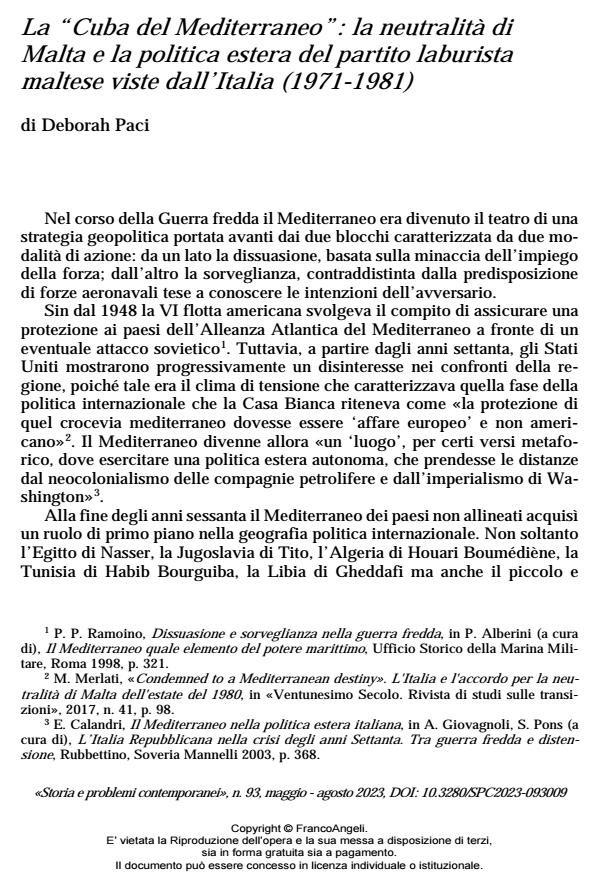La “Cuba del Mediterraneo”: la neutralità di Malta e la politica estera del partito laburista maltese viste dall’Italia (1971-1981)
Titolo Rivista STORIA E PROBLEMI CONTEMPORANEI
Autori/Curatori Deborah Paci
Anno di pubblicazione 2024 Fascicolo 2023/93
Lingua Italiano Numero pagine 26 P. 123-148 Dimensione file 259 KB
DOI 10.3280/SPC2024-093009
Il DOI è il codice a barre della proprietà intellettuale: per saperne di più
clicca qui
Qui sotto puoi vedere in anteprima la prima pagina di questo articolo.
Se questo articolo ti interessa, lo puoi acquistare (e scaricare in formato pdf) seguendo le facili indicazioni per acquistare il download credit. Acquista Download Credits per scaricare questo Articolo in formato PDF

FrancoAngeli è membro della Publishers International Linking Association, Inc (PILA)associazione indipendente e non profit per facilitare (attraverso i servizi tecnologici implementati da CrossRef.org) l’accesso degli studiosi ai contenuti digitali nelle pubblicazioni professionali e scientifiche
During the Cold War Malta, due to its geostrategic position, played a prominent role in the relations between the Soviet and Western blocs. Dom Mintoff, leader of the Labour Party known as the Fidel Castro of the Mediterranean, engaged in an autonomous foreign policy playing on several fronts in order to negotiate the best conditions for the young Maltese Republic. The author provides a reflection on how the policy of Dom Mintoff’s government was interpreted by Italy. First the political framework in Malta will be addressed; then a political crisis juncture in the relations between Malta and Libya represented by the Medina dispute will be analysed. Finally, the focus will be on the bilateral agreement between Italy and Malta on the protection of the archipelago’s neutrality.
Parole chiave:Malta, Italy, Libya, Dom Mintoff, neutrality, cold war
Deborah Paci, La “Cuba del Mediterraneo”: la neutralità di Malta e la politica estera del partito laburista maltese viste dall’Italia (1971-1981) in "STORIA E PROBLEMI CONTEMPORANEI" 93/2023, pp 123-148, DOI: 10.3280/SPC2024-093009